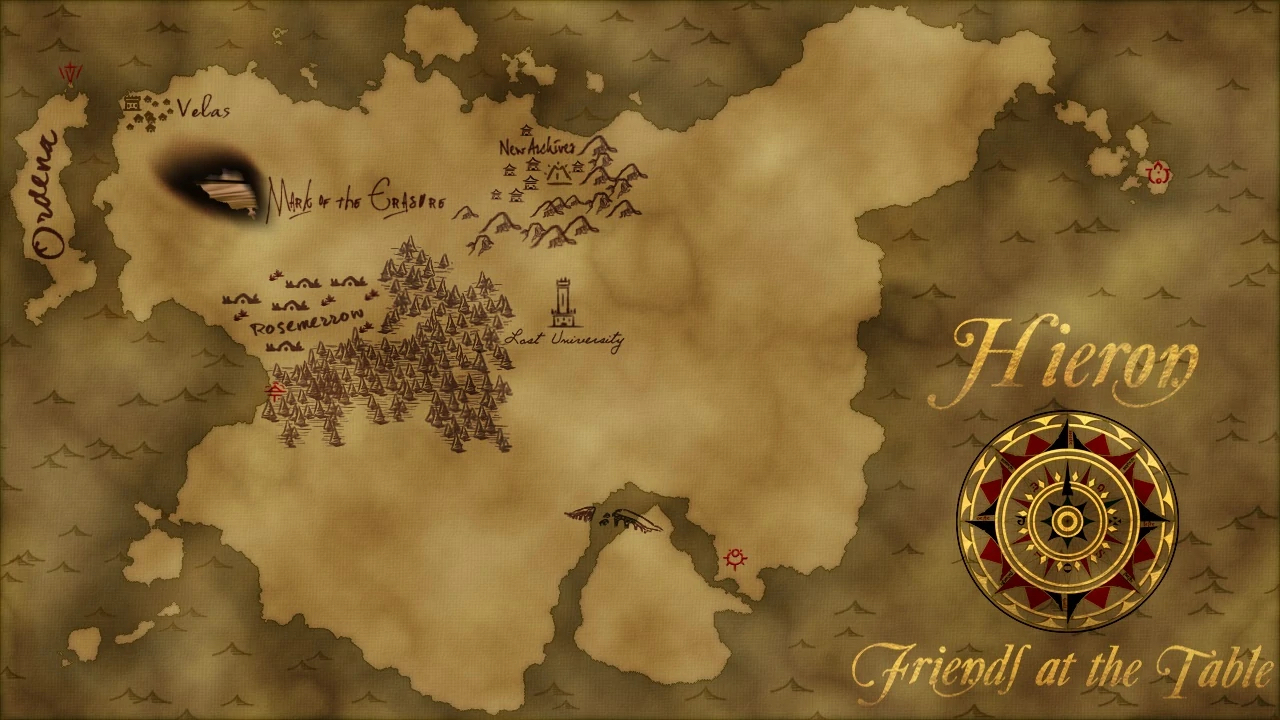
The continent of Hieron and its surroundings are the setting first created for Autumn in Hieron, Friends at the Table's first Dungeon World campaign, and revisited in Marielda, Winter in Hieron, and Spring in Hieron.
Many years ago, it was struck by a cataclysm known as The Erasure.
Places[edit | edit source]
Major Settlements[edit | edit source]
- Velas
- Ordenna
- Nacre
- Marielda
- The New Archives
- Rosemerrow
- The Last University
- The Buoy
- The Isles of Flight
Towns[edit | edit source]
Ruins[edit | edit source]
Domains[edit | edit source]
History[edit | edit source]
“
I know what you're thinking, Sige. If every god sprang from something else, where did I come from? Well, one day, Nothing flinched, and there I was. And instantly, it regretted me, and so my good friend Tristero was born. Haven't seen him in a minute, though. Still, the point is, that, in moments like these, gods don't design what their offspring looks like.”
The land of Hieron is the body of the god Samol. During Samol's appearances in the story, the state of his body is a direct reflection of the state of Hieron.
Hieron is surrounded on all sides by an empty void known as Nothing. Samol was spontaneously born from Nothing, immediately followed by Tristero, the god of death, who ushers the souls of the departed back into the void. Samol refers to the ability for gods to spontaneously emerge from strong or unexpected emotions as "the divine impulse".
Through the divine impulse, Samol spontaneously brought Severea into being from his desire to see the empty world filled with life, and Samothes from his desire to see that life shepherded and cared for.
In his most legendary act, Samothes entered a mountain of fire and metal and forged the Sun, filling the world with light and introducing time to Hieron through its rising and setting. Prior to that, the only light on Hieron was the "ambient glow" of the gods themselves.[1]
The gods used their divine authority to write and rewrite history, undoing past events that had caused things to occur in a way that they did not approve, in a process known as Reconfiguration.
In time, however, Samol began to fall ill, afflicted by the Heat and the Dark. Under these circumstances, the relationship between Samot and Samothes dissolved and the two gods eventually went to war over differing opinions regarding the Heat and the Dark. In a desperate act, Samothes' people retreated to the southern city of Marielda and, from within Samothes' mountain of flame, he tore the city from the mainland to keep away Samot's forces.
Tristero, growing weary of presiding over dead souls' trips into the void, retired to the city of Nacre, partially giving up his godhood to preserve it amid the dark days ahead.
Shortly afterward, Samothes himself was killed by his son Maelgwyn, who killed him with the Blade in the Dark in a misguided plan to protect Hieron. At the moment of Samothes' death, Marielda reconfigured itself to contain his tomb, a magic artifact which sapped away the gods' divine authority to rewrite history in order to protect the city.
At some point after this, Hieron went through an apocalyptic period of loosely related cataclysms known as the Erasure which decimated many civilizations and left others struggling to survive. The Mark of the Erasure was caused by a failed mage experiment, and the displaced land became the northwestern island of Ordenna.
Samol claims that the name "Hieron" comes from someone mishearing him say "some place higher on", referring to how Hieron floats in the void of Nothing.[2]
Geology[edit | edit source]
During the Autumn in Hieron worldbuilding episode, Hieron is established to be the size of New York state. Hieron is a flat world and does not have a horizon.
Cosmos[edit | edit source]
Hieron's sun is a structure created by the god Samothes.
Hieron's sky also contains two moons, Del and Bri, created by Severea and Galenica. During the events of Marielda, Samot created the Stars in an unfinished effort to engineer a solution to the Heat and the Dark.
Strata and Laminae[edit | edit source]
Although the gods of Hieron possessed the ability to rewrite history and undo events, the most major reconfigurations did not erase the previous world entirely. Previous versions of Hieron are layered on top of each other below the "surface" level of the world. "Subterranean" dwellers use a system of "strata" and "laminae" to orient themselves within these different levels, with the surface being Stratum Zero and numbers increasing as one advances downward.
Austin explains that during Reconfiguration, "you don't get to erase anything. [The Strata] all exist, they get partially fucked up in the layering ... which is why it's not just complete worlds ... Each stratum is a reset all the way to zero, whereas each lamina is just loading a slightly previous version, and changing from there".[3]
Stratum Zero has two laminae: Lamina Zero, the surface world, and Lamina One, and a threshold space that the party enters during Winter in Hieron 08: The Meeting House. Stratum One is the world from immediately before Samothes' death.
Nearly every strata has its own sun, created by Samothes.
The lowest stratum of Hieron represents its state at the time of Samol's birth, and can only be visited by Samol and his kin. The second-lowest stratum is the empire of Death. At the end of Marielda, Dark Sun Samothes is trapped there by the magic of Samothes' tomb.